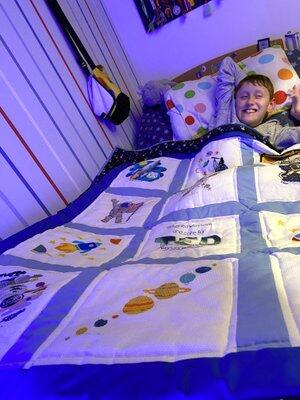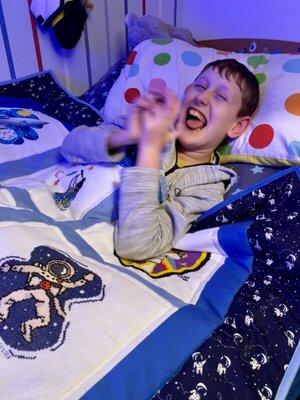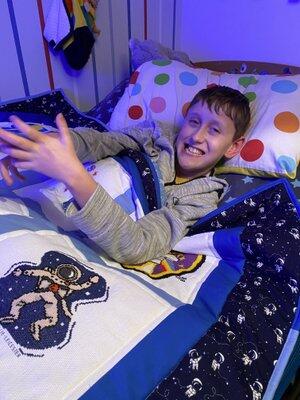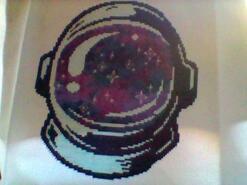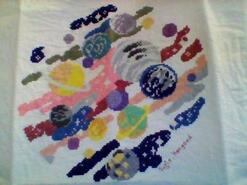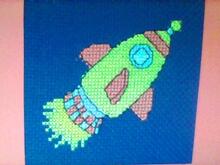BiographyTed was born with a very rare genetic metabolic disorder called Aromatic Amino Acid Decarboxylase deficiency (AADC).
AADC is so rare only six children in the UK have it and both parents must carry the faulty gene.
Ted has oculogyric crises, which can happen several times a week. During a crisis his muscles twist, shake and his eyes fix up. It is very distressing for the family.
He takes 11 different medications to keep him alive.
Ted communicates with his eyes or by smiling and has a dazzling smile and an infectious laugh. He loves to watch his dad running, he likes to go out on family day trips and he loved the boat trip for his recent holiday to the Isle of Wight. His favourite pastime is playing on his IPad and watching Mr Tumble whom he adores.
Life for Ted and his family is challenging, he often has gastric pain, is sick, has difficulty breathing and muscular crises can last for hours.
When Ted was born full term in December 2008 he appeared healthy, but was taken to the special care unit as doctors noticed he had mini tremors. He was also suffering from reflux.
By three months we noticed he wasn’t reaching for toys, he also had mini shakes and his pupils would fix upwards. At six months Ted was admitted to hospital with pneumonia.
When he came out of hospital he wasn’t able to do anything at all, it was like walking out with a new-born. He couldn’t hold his head up, he had no fine motor skills and he didn’t reach for anything meaning his milestone weren’t being met. Ted hadn’t gained any weight since he was 14 weeks old, he screamed and didn’t sleep. Ted screamed permanently unless he was in daddy’s arms. If we snuggled him we would get a lovely smile. We knew there was something very wrong, but we didn’t know what.
We had a lot of emotions, our eldest son Miles, now 15, was only four at the time and was desperate for a little brother. We tried to explain he was so poorly.
Ted was referred to a paediatrician and started physiotherapy and occupational therapy. He was tested for the genetic disorder SMA Type 1.
The test came back negative and Ted was referred to Oxford’s John Radcliffe Hospital for an MRI scan, a lumbar puncture and blood tests. In June 2009, we were called in and told by doctors they had found the cause. Ted had the very rare genetic metabolic disorder AADC.
AADC deficiency symptoms include gastro-intestinal problems, reflux and painful abdominal cramps, feeding issues, breathing difficulties, hypotonia (low muscle tone), hypoglycaemia, sleep disturbance and oculogyric crisis.
Medication can be prescribed for AADC, although this isn’t a cure it suppresses some of the worst symptoms. His care is now under Great Ormond Street Children’s Hospital and a world leading specialist in AADC.
Ted also has a younger sister Emilia, now five, who was born healthy following CVS testing during pregnancy.
For Ted and his family the hardest thing to cope with continues to be the oculogyric crises, Ted’s muscles twist, shake and his eyes fix up. He’ll need to sleep and he’ll then have no energy to hold his head up. Anything can trigger it. We’ve had days out when we have to get Ted straight home. It is challenging going out because Ted is constantly sick. Miles and Emilia don’t want their brother to miss out though and they are very understanding.â€
Ted goes to a special needs unit in a mainstream school and has his own bed there. He has scoliosis of the spine and uses a wheelchair. Due to his gastric problems and difficulty swallowing he is fed through a tube into his stomach. On a good day Ted can say seven words: ‘no, hello, bye, I-Pad, love her and yes’. On other days he is so locked in he can’t move or talk.
Our family has fundraised for AADC Research Trust. I bake for cakes sales and Sven has run half marathons. We want to give back to the community and the trust who support us all and continue to research to create a cure for this horrific terminal brain disease.
|
